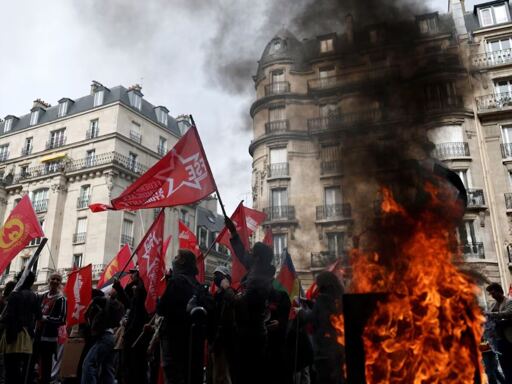Trade unions in France held a nationwide day of strikes yesterday, Thursday 2 October, in protest against austerity measures. They’re pressing newcomer PM Sébastien Lecornu to consider a wealth tax on the super-rich, rather than cutting the budget for citizens already struggling with years of economic turmoil.
The Confédération Générale du Travail (CGT) counted the participants of yesterday’s strike at 600,000, across 230 towns and cities. However, the French police force put the number at just 195,000. If the latter is true, this was less than three times the number of the 70,000 officers mobilised in the heavy-handed police response.
Lecornu: strikes in France from the off
On 10 September, Sébastien Lecornu became France’s new prime minister. He’s the country’s fifth PM of the last two years. President Emmanuel Macron appointed him to the position, after he had previously held the office of defence minister.
The previous government, headed by PM François Bayrou, was brought down by a no-confidence vote on 8 September. Bayrou had proposed nearly EUR38bn in tax hikes and spending cuts, uniting parliament’s left and right in opposition against him. Likewise, Lecornu was immediately greeted by a wave of ‘Block Everything’ protests against his anticipated austerity measures when he first came to power.
These demonstrations were later followed by a nationwide strike on 18 September. As many as one million workers walked out in the name of social justice and in protest against further tax hikes. Transport operatives, hospital and pharmacy workers, and teachers joined the industrial action, causing major disruption across the country.
Fresh wave of action
Yesterday’s strikes in France were smaller that those on the 18th and immediately after Lecornu’s election. However, 24,000 people marched in Paris alone, with the Eiffel Tower shutting down in support. The CGT Eiffel Tower union stated that:
Following today’s national inter-union call, a general assembly of Eiffel Tower employees was held this morning. A large majority of workers voted in favor of the strike.
The unions have demanded the Lecornu scrap Macron’s changes to the pension system. In 2023, the president pushed the modifications through without a parliamentary vote. They raised the retirement age from 62 to 64, and removed several privileges previously held by the workers.
More than a quarter of all teaching personnel in France joined Thursday’s industrial action. FSU-SNUipp education union leader Aurélie Gagnier stated that:
the workers we meet support the need for more tax justice and social justice and recognise the need for a budget that addresses schools’ needs.
The strikes in France maintained pressure on the new PM, who has not yet appointed ministers or revealed his budget plan. Lecornu has stated that he will abandon the unpopular idea of cutting two public holidays. Sources close to the PM suggested that he is considering tax exemptions and lower social charges on overtime work. Other potential changes might include a reduction in income tax for dual-income couples who earn just over minimum wage.
No tax on the ultra-rich
Last week, however, the PM told Le Parisien that he didn’t favour the idea of a tax on the ultra-rich – the so-called ‘Zuchman tax’. Named for economist Gabriel Zuchman, the tax would consist of a 2% wealth tax on the country’s richest 0.01%.
Lecornu cited the fact that the tax would also apply to business assets as the reason for his distaste. The PM stated that:
There is political and societal demand for greater tax justice, particularly in order to restore our public finances. We can’t dismiss this debate out of hand. But is the Zucman tax the right answer? The only answer? Personally, I do not believe so.
The Zuchman tax was a key demand of the French parliament’s left wing. Socialist leader Olivier Faure warned that:
If nothing changes, the outcome is already known … This government will fall.
France is predicted to suffer a budget deficit of 5.4% of it’s GDP this year. Lecornu has stated that he’s aiming for a 4.7% budget deficit next year, barely changed from Bayrou’s 4.8% target.
Today, Lecornu will hold a series of talks with opposition leaders. They expect him to lay out his full budget plan ahead of a coming parliamentary vote. Their support – or lack thereof – could make or break the new PM’s nascent leadership of the increasingly economically and politically fraught European nation.
Featured image via the Canary
From Canary via this RSS feed


